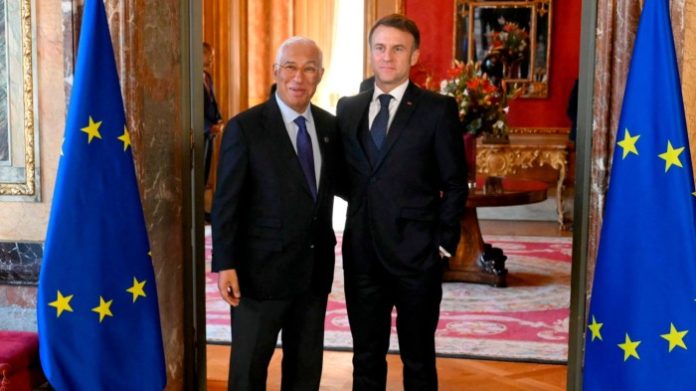Unlock the White House Watch newsletter for free
Your guide to what the 2024 US election means for Washington and the world
EU leaders have vowed to retaliate against possible tariffs imposed by US President Donald Trump, warning that both sides would be hurt by a trade war.
Trump has said he will “absolutely” hit Europe with trade restrictions, following tariffs he announced against China, Canada and Mexico this weekend. He has yet to detail what those possible measures could be or when they would be applied.
“If we were attacked on trade issues, Europe, as a power that considers itself as such, will have to make itself respected and therefore react,” said French President Emmanuel Macron on Monday.
The EU has the largest trade deficit with the US, which Trump has consistently decried. Trump has also demanded European capitals spend significantly more on defence, or risk losing US security guarantees that have underpinned the continent’s defence since the second world war.
Macron, speaking at the start of a summit of EU and Nato leaders that will discuss transatlantic issues and defence funding, said Europe should promote domestic products to strengthen its trade position: “It is by deciding to buy and preferring European purchases that [Europe] will be more independent, it is quite simple.”
The European Commission, which represents the 27-country bloc on trade, has prepared potential retaliatory measures that could be used in the event of Trump imposing tariffs. They have kept the details secret in an attempt to not further provoke the US president.
“We were listening carefully to [Trump’s] words and of course we are also preparing on our side,” the EU’s chief diplomat Kaja Kallas said as she arrived at the summit.
Two EU officials briefed on the preparations said that significant contingency planning was under way. “We are ready to act if we need to,” said one.
German chancellor Olaf Scholz said that “as a strong economic area, we can shape our own affairs and can also respond to tariff policies with tariff policies”.
A trade war would be “bad for the US and bad for Europe”, Scholz said. But he also sought to downplay the effect of such a conflict, saying that Europe could renew efforts to strike up more free trade deals with other parts of the world.
Other EU leaders stressed the need to continue engaging with Trump to avoid tit-for-tat measures spiralling into a trade war.
“We have to negotiate with Trump . . . this is one of the most important issues today,” said Finnish Prime Minister Petteri Orpo. “I’m not going to start a war. I want to start negotiations.”
Austrian chancellor Alexander Schallenberg pointed out that while the US has a trade deficit in goods with the EU, the bloc had a “deficit in services” with the US. “So we should be able to reach an agreement there.”
Lithuanian President Gitanas Nausėda said Europe should engage in a “positive economic agenda” with the US instead of “fighting with each other” on trade. He suggested buying more weapons and liquefied natural gas from the US.
“We have to propose something that could be interesting and attractive for United States like free trade agreements in automotive industry or like buying more energy resources,” he said.






